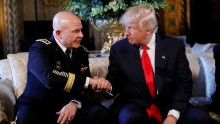On February 20, the President of the US Donald Trump appointed Lieutenant General Herbert Raymond “HR” McMaster national security adviser. Before him this function had three weeks and three days been in the hands of Lieutenant General Michael Flynn, who had to resign amidst denunciation for having discussion the sanctions issue with Russian ambassador Sergey Kislyak.
At the Pentagon McMaster for a longer time has been promoting the adaptation of the US armed forces to the hybrid war methods employed by Russia against Ukraine and increasing the US army’s preparedness for an eventual face-off with Moscow.
In May 2016, speaking at the CSIS (Center for Strategic and International Studies), an influential American think-tank, McMaster noted that Russia grew stronger while the US was reducing its strategic military presence in a number of regions. He said directly, citing the examples of Ukraine and Crimea in particular, that the US and NATO philosophy of deterring Russia had failed.
“And what we’re seeing now is we’ve awakened to, obviously, this threat from Russia, who is waging limited war for limited objectives – annexing Crimea, invading Ukraine – at zero cost, consolidating gains over that territory, and portraying the reaction by us and allies and partners as escalatory,” emphasized McMaster.
According to him, the approach towards military deterrence of the aggressor has to be based on the philosophy of forward deterrence, on being able to ratchet up the cost at the frontier and this approach to deterrence must be consistent with deterrence by denial, convincing the enemy that he is unable to accomplish his objectives at a reasonable cost. That, “rather than sort of an offshore balancing approach and the threat of punitive action at long distance later, which … recent experience confirms to be inadequate.”
“THIS POSITION WILL BE HELD BY A MAN WHO SOBERLY EVALUATES THE GLOBAL SITUATION”
Oleksandr TSVIETKOV, expert in American studies, professor, Diplomatic Academy at the Ministry of Foreign Affairs of Ukraine:
“This is a powerful move by Trump to add advisers to the president’s inner cabinet. Now there is a very strong team led by Lieutenant General McMaster. Importantly, Lieutenant General Keith Kellogg will remain the US President Chief of Staff and Executive Secretary of the National Security Council. Trump’s entourage only lacks a good economy adviser. All the other posts are manned by strong players. The biggest worry for the bureaucratic circles is how successfully the new national security adviser will build relations with Bannon, the senior adviser.
“McMaster is a career military officer, who has never worked in Washington D.C. and the Pentagon – otherwise speaking, in bureaucratic circles. He is an active duty decorated army general, expert in commanding big military units. He also holds a Ph.D. in American history, having written a critical dissertation about the USA’s strategy in Vietnam. In 1997 he published his book Dereliction of Duty. He used the Vietnam example to analyze the mistakes and gains of that war and draft the most efficient manners to employ the US Army in the future.
“Moreover, he has good personal and business relations with the current Defense Secretary, General James Mattis.
“Among the military he is nicknamed ‘Rebel.’ They also describe him as a manager who never allows stupidity and is ‘as straight as an arrow.’ In other words, if he believes in a case, he is never shy to ask principals and stand up for his idea. He was twice overlooked in promotion for being outspoken in his demands and speaking his mind.
“For us McMaster’s appointment means that this position will be held by a man who soberly evaluates the global situation, key risks and threats, and will present the president with objective information.
“There will be no backstage games in which his predecessor General Flynn indulged. McMaster will evaluate facts based on objective reality, and recommend those solutions which will lead to success from his perspective as a military man and a shrewd theoretician.
“It will be a pure coincidence that McMaster was appointed on that very day when Russia began its aggression against Ukraine three years ago. The thing is that this position cannot remain vacant, and since it does not require approval by Senate, the president filled it as quickly as he could.
“There were several candidates for this post, some of whom insisted they would bring their own staff. The president did not like those demands, so he picked McMaster but gives him carte blanche for manning the national security staff with whoever he deems necessary.
“What is the most intriguing thing in the US now? The president picks those advisors for his inner circle whom he doubtlessly trusts. Amidst his ignoring the criticism coming from the party apparatus and his distrust for the bureaucracy in Washington D.C., he needs to rely on this core inner group. McMaster fits in this category perfectly.
“McMaster backs the strengthening of the USA’s adequate role in NATO, the support for allies, and he will most likely be able to offer sober recommendations as to how the US should behave in the Middle East, Central Asia, and particularly in Iraq. He will also give a sober assessment of the possibility of cooperation with Russia, based on America’s interests.
“In his career he has been evaluating the US Army’s abilities in any conflict situations, in particular, in military confrontations. In other words, he has been studying the adequacy of capability, qualification, and armaments to a certain situation. That is why McMaster will be interested in all the situations we are experiencing, including our conflict with Russia. But here the first place will belong to a political decision complemented with power leverage and tools.
“A national security adviser must combine political sway and political vision, assess the geopolitical effect of events, and adapt military possibilities accordingly. McMaster, being a scholar and expert on efficient management of the army and command, can be expected to take progressive steps.”








